Farmer John Writes: Soil Rocks
Week 1, June 13-17
Welcome to the First Harvest Week of our 27th Season as a Community Supported Agriculture Farm!
Your Box This Week – Saturday Deliveries:
Cooking Greens — Kale, pac choi
Salad Greens — Lettuce, pea shoots (in bag)
Alliums — Garlic scapes, scallions
Root Crops — Radishes
Herbs — Cilantro
Notes on Your Box Contents This Week
Pac Choi and radish leaves are a bit tattered from flea beetles.
Last year, I said we wouldn’t grow pea shoots anymore, because some of our shareholders complained that they did not appreciate them. But then, other shareholders objected to the moratorium on pea shoots, and requested that we offer them again. So, we are growing them again this year, but not as much. We harvested the pea shoots earlier than usual, so they should be more tender.
A Journey
Joining a CSA farm is a journey into the origin of your food.
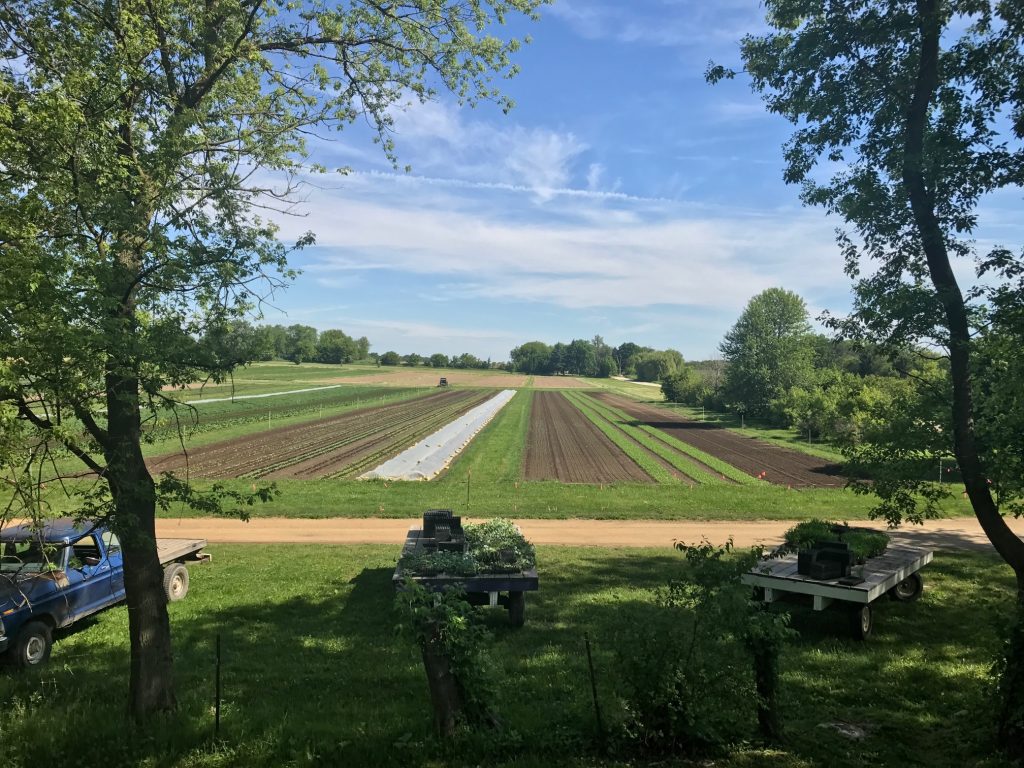
View from the Farm Office
One of the great things about being a CSA shareholder (at least according to me, Farmer John) is that you become one with the weather…well, your vegetables and herbs become one with the weather. If you want to feel close to Planet Earth–its winds, rains and soil–open your box and behold its contents…and read Farm News.
The weather this spring was quite unusual, but then, the weather every spring is quite unusual. Farmers know this, and they continually talk about how unusual the weather is in the current spring, compared to all the other springs that they remember. For over 60 years, I’ve been noticing that most farmers think something new is up with the weather in the current season. They’ll often say they have never seen anything like it. I’m going to mention two allegedly new things that are up with the weather this spring.
Cold, Wet, Hot, Dry
1) This spring was cold and wet—really cold and really wet. This past weekend, however, was hot and dry. In late April, back when the weather was cold and wet, I was going to seed 6 beds of spinach for the first two weeks of deliveries. Then I thought to myself, “don’t do it. It’s not going to work. The spinach will look lovely and then the weather will turn hot and dry, and over a weekend it will go from green and lush to brown and crinkled. You’ll lose the second week of spinach.” I don’t know if this was intuition or just recognizing the facts (though there are no facts about future weather; there are only facts about the current and past weather.)
I put in 3 beds of spinach, not 6. The recipients of the first deliveries of this week will receive beautiful spinach. Those of you who receive your delivery on Saturday will receive no spinach, because of this week’s heat wave. Sorry. That’s Midwestern spring.
For sure, the boxes for the second week will receive no spinach. This would have been the result of seeding it and having it go to waste in the heat, if I had seeded it; instead, it is the result of not seeding the spinach at all.
Wind, Rain
2) The rains were a torrent this spring, like a river pouring out of the sky. Sometimes strong winds carried the rain sideways, lashing the plants horizontally. Rudolf Steiner (founder of Biodynamic Agriculture and numerous other Anthroposophical movements and disciplines) said that any healthy input in too great a quantity is a poison, even water. Water did not poison our fields this spring, but it compromised them.
Our soil is a silty clay loam. That means it is a bit susceptible to crusting or caking when sufficient moisture and heat are present, similar to the process by which pottery comes about. Over the years, our soil has become more crumbly. (A more apt term than crumbly is flocculant or friable.) Because of our extensive use of cover crops, applications of compost, and tillage methods that are intended to aerate the soil and stimulate the microbial life, our soil has become easier to work with over the years—not as easy to work with as I would like, but still, its tilth is vastly improved.
This season, the rains pounded our soil so hard, and the sun baked it so hot, that it crusted severely. It developed something like a hard, thick skin or a seal that kept the oxygen from adequately permeating it; it kept the soil from breathing properly. We have broken that seal of soil with our cultivating equipment to let it breathe again.
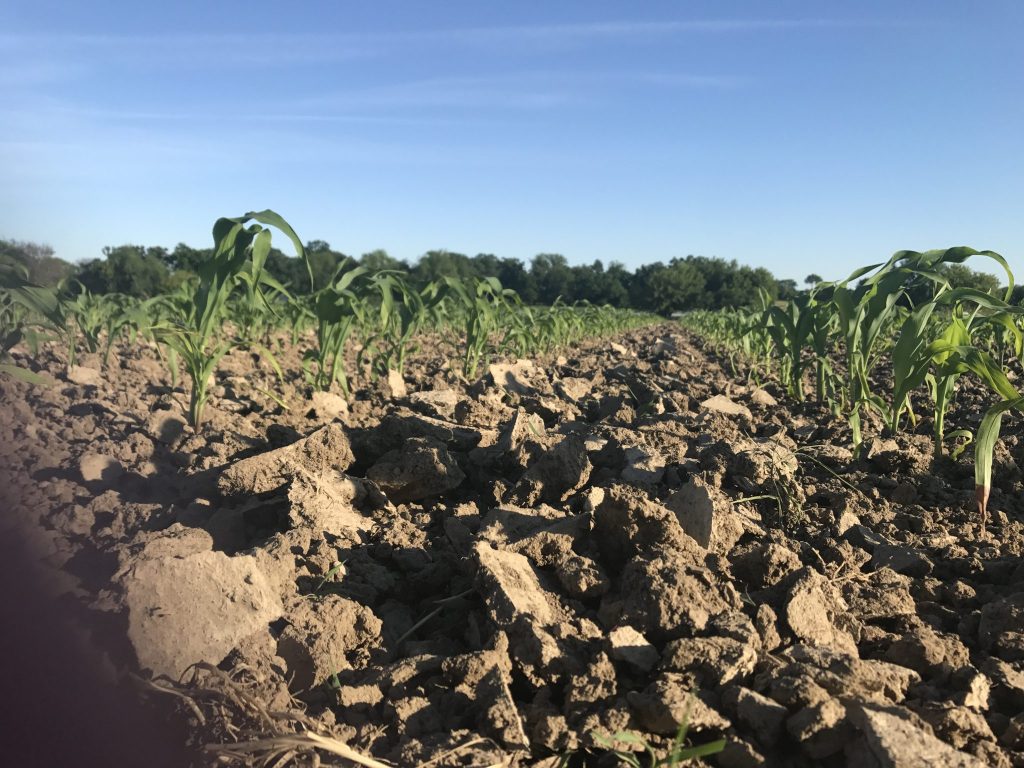
After Cultivating, the Broken Seal of Soil (I have never seen anything like it.)
It was probably that caked layer of soil more-so than the cool weather that caused our crops to mature a week later than usual. Usually, when rain gets in the way of farming, it means the crops didn’t get planted on time, but this season, it was more that the weather acted as a bit of a kiln for our soil.
I’ll add here that a few miles west of the farm, there is an area known as the prairie, though I refer to it more often as the sand. (There’s pretty much no prairie there; it’s just called prairie because it’s flat.) If the prairie gets rain, the crops are great. If it doesn’t get rain, the crops fail. This year, however, the corn down on the sand is about a foot shorter than usual. I think it’s for the same reason—the pounding rains and sun combined to bake the soil into a crust, preventing the soil from breathing properly.
Coming Soon
Broccoli
Zucchini
Cabbage
Beets
Dill
Basil
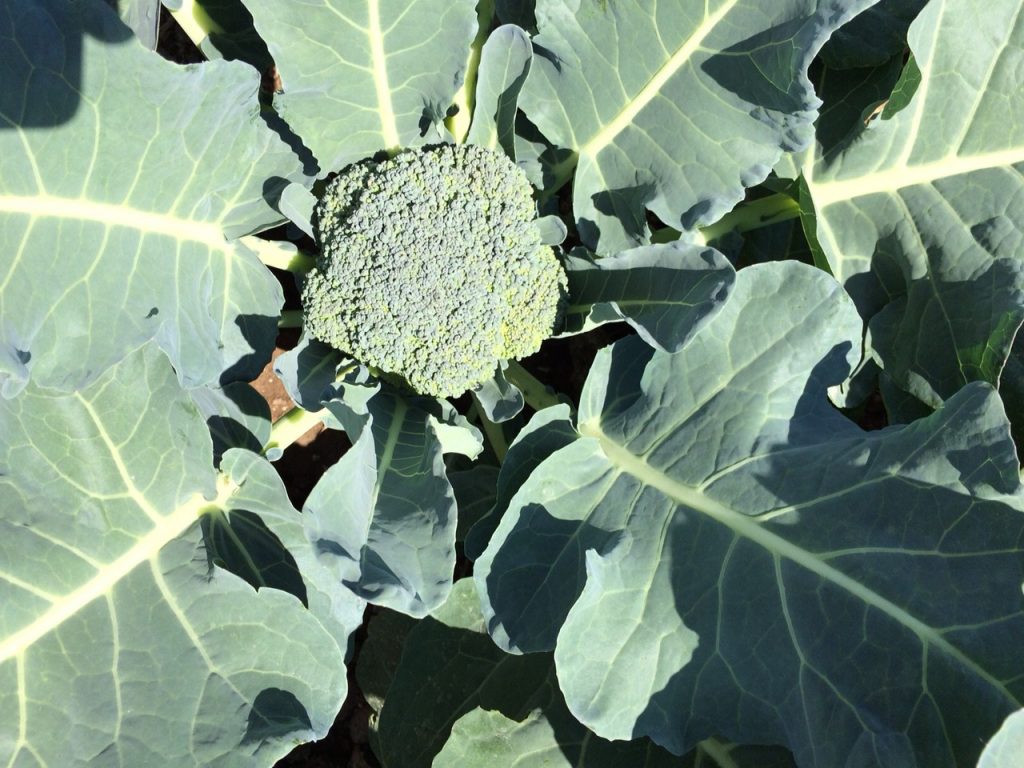
Heading Towards You
Bounty
We’re going to have a hard time fitting this week’s harvest into the CSA boxes. Please tell your friends that we are continuing to sell shares as we enter the harvest season. Send them to www.angelicorganics.com/receive-our-vegetables
Sign up for the Free Recipe Service
Make sure you sign up for the Local Thyme recipe service we offer with your share. It has received many great reviews from our shareholders in previous seasons. Find the instructions for signing up for Local Thyme here: www.angelicorganics.com/local-thyme
Please Fold Your Boxes Properly and Return Them to Your Site
The farm re-uses the vegetable boxes. Please watch this video to see how to easily flatten your vegetable box. Flaps are easily torn when the boxes are dismantled improperly, and then the box bottom might later burst open with fresh, organic local produce heading towards the floor. Please return your empty, flattened vegetable boxes to your delivery site.
Have the Best Shareholder Experience
For the best shareholder experience, visit www.angelicorganics.com/best-shareholder-experience
Let us Know
Let Shelly know anything you’d like to share about this week’s box at email hidden; JavaScript is required. Please note the week and day of delivery, your site, when you picked up your box, and any comments about your box.
More from Shareholders
Visit us often at www.facebook.com/angelicorganics where we post exciting farm developments regularly, and shareholders post recipes, tips, and photos.
We hope you enjoy your first box of the season.
Warmly,
Farmer John
The Learning Center
Angelic Organics Learning Center is an exciting and engaging place to learn about food, farming, and caring for the earth. Sign up for a hands-on farm workshop at www.learngrowconnect.org/events
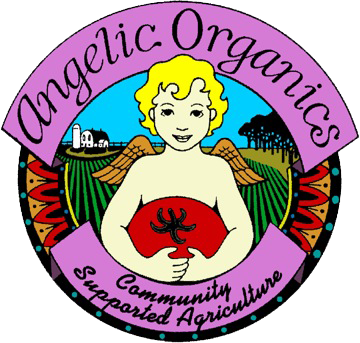
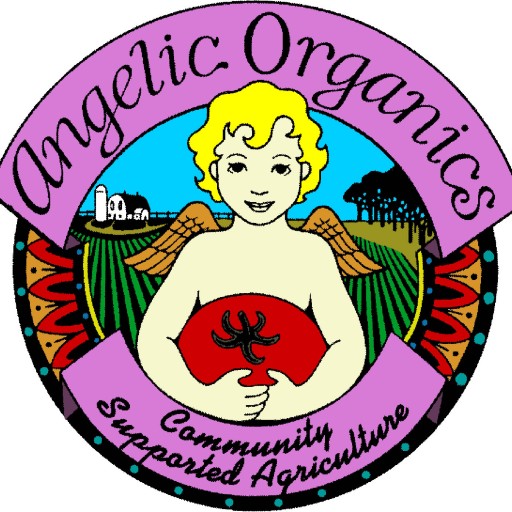
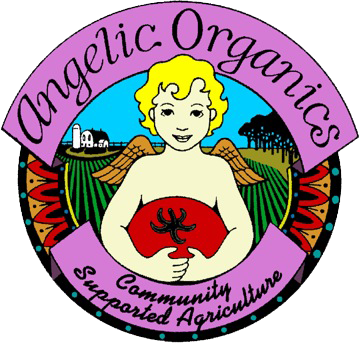

[…] More on Weather Last week I wrote about this week’s spinach, or rather, absence of spinach: For sure, the boxes for the second week will receive no spinach. This would have been the result of seeding it and having it go to waste in the heat, if I had seeded it; instead, it is the result of not seeding the spinach at all. If you missed that issue, Soil Rocks, check it out here. […]